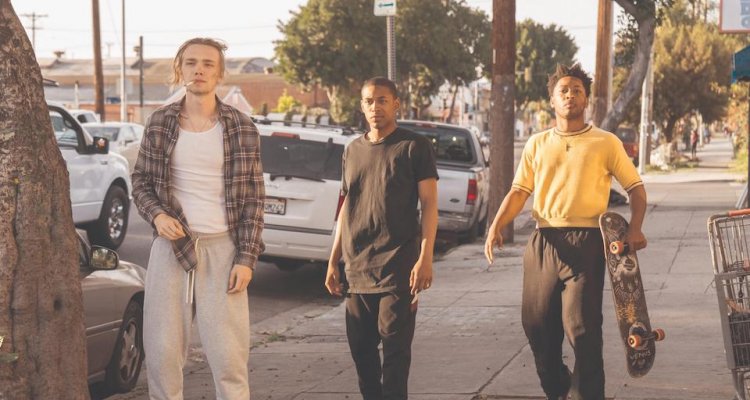The sound and looming shadows of L.A.P.D. helicopters oppressively hover over a South L.A. neighborhood, as three teens come of age in the relentlessly bleak drama “Gully.” The feature is billed as set in a dystopian Los Angeles, but there’s little indication of a true grim dystopy here. Instead, the setting seems more like an amplified version of a real-world crime-ridden neighborhood that you’d see on a Fox news broadcast, where troubled young men live lives of violence and mayhem with little thought for consequence.
READ MORE: The 100 Most Anticipated Films Of 2019
“Gully” is sympathetic to the plights of its trio of protagonists, who are all living with generational trauma and past pain that seeps into their present. Calvin (Jacob Lattimore) is bright but struggles with unnamed mental health issues, and his mother (Robin Givens) pushes him to take his meds. Chronically truant Nicky (Charlie Plummer) lives with his young single mother (Amber Heard) and worries over his pregnant girlfriend (Zoe Renee). Jesse (Kelvin Harrison Jr.) lives a nearly silent existence and tries to cope with the abuse of his adoptive father (John Corbett), which is somehow even worse than it first appears.
READ MORE: Tribeca Film Festival: 15 Must-See Movies
The three young men take solace in their close friendship, but wreak havoc on their neighborhood streets, stealing cars and randomly beating people. We see the world through their eyes, as their perspective shifts from seeing the real world to seeing it as part of a “Grand Theft Auto“-style video game, complete with over-the-top violence and vehicle upgrades. Meanwhile, Greg, an older character (Jonathan Majors) is freshly out of prison and is trying to make a clean life on the outside, and homeless Mr. Christmas (Terrence Howard) offers poetic commentary on the events he sees in the neighborhood.
![Tribeca GULLY _[CHRIS_WILLARD]_3_PR_HR_UBG_CMYK](https://theplaylist.net/wp-content/uploads/2019/03/GULLY_CHRIS_WILLARD_3_PR_HR_UBG_CMYK.jpg) Director Nabil Elderkin is known for his music videos for Frank Ocean, Kendrick Lamar, and SZA, as well as Travis Scott and Vince Staples, who make cameos here. As his feature directorial debut, “Gully” has the style you’d expect from a high-profile music video director, particularly in the surreal video game sequences, but there’s a hollowness here too. Marcus J. Guillory‘s script is nihilistic, piling on the trauma for the young protagonists, but it all feels meaningless and without feeling that an audience can connect to. The viewer should care enough about these people to have an emotional reaction to the awful experiences they’re having, but the harsh and gnarly “Gully,” which doesn’t much of anything meaningful to say either, leaves you feeling empty and glad when it’s over.
Director Nabil Elderkin is known for his music videos for Frank Ocean, Kendrick Lamar, and SZA, as well as Travis Scott and Vince Staples, who make cameos here. As his feature directorial debut, “Gully” has the style you’d expect from a high-profile music video director, particularly in the surreal video game sequences, but there’s a hollowness here too. Marcus J. Guillory‘s script is nihilistic, piling on the trauma for the young protagonists, but it all feels meaningless and without feeling that an audience can connect to. The viewer should care enough about these people to have an emotional reaction to the awful experiences they’re having, but the harsh and gnarly “Gully,” which doesn’t much of anything meaningful to say either, leaves you feeling empty and glad when it’s over.
![Tribeca GULLY_[CHRIS_WILLARD]_2_PR_HR_UBG_CMYK](https://theplaylist.net/wp-content/uploads/2019/03/GULLY_CHRIS_WILLARD_2_PR_HR_UBG_CMYK.jpg) Beyond the strength of the visuals, there’s promise in the young cast that you see glimpses of here. Lattimore, Plummer, and Harrison have been great elsewhere over the last few years, and do well with what they’re given here. However, it’s never enough to make “Gully” worth watching. Its raw, gritty approach feels like an effort from the filmmakers, but it’s mostly work for the audience to endure. [C-]
Beyond the strength of the visuals, there’s promise in the young cast that you see glimpses of here. Lattimore, Plummer, and Harrison have been great elsewhere over the last few years, and do well with what they’re given here. However, it’s never enough to make “Gully” worth watching. Its raw, gritty approach feels like an effort from the filmmakers, but it’s mostly work for the audience to endure. [C-]
Follow along with all our coverage from the 2019 Tribeca Film Festival here.

